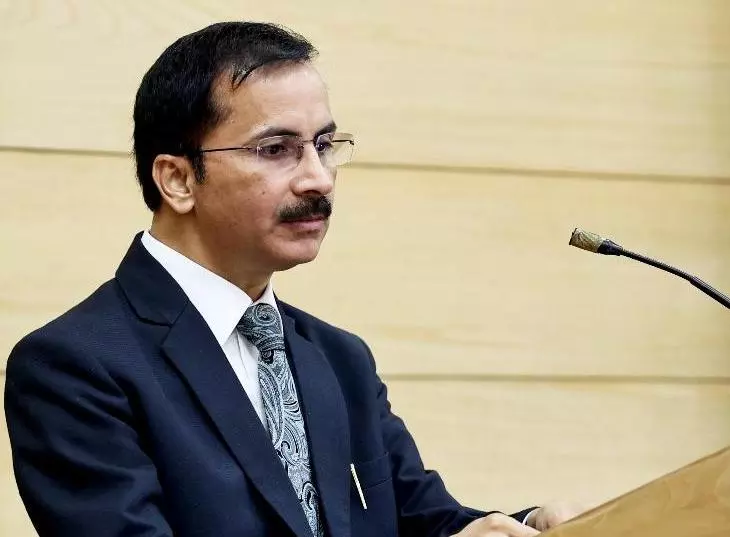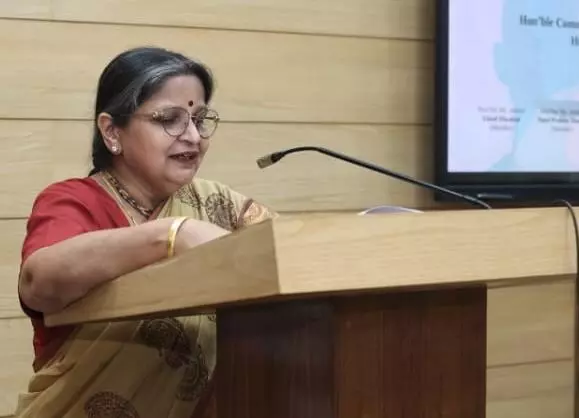Allahabad High Court Hosts Gender Sensitization Workshop To Address Gender Stereotypes And Bias
LIVELAW NEWS NETWORK
1 May 2025 5:11 PM IST
Two Day's Workshop on “Gender Sensitization” was organized by the Committee for Sensitization of Family Court Matters, High Court of Judicature at Allahabad on 26th & 27th April, 2025 for Family Court Judges (Agra Cluster) at the Judicial Training & Research Institute, U.P., Lucknow, in which the Judicial Officers of Family Court from the districts Agra, Aligarh,...
Two Day's Workshop on “Gender Sensitization” was organized by the Committee for Sensitization of Family Court Matters, High Court of Judicature at Allahabad on 26th & 27th April, 2025 for Family Court Judges (Agra Cluster) at the Judicial Training & Research Institute, U.P., Lucknow, in which the Judicial Officers of Family Court from the districts Agra, Aligarh, Auraiya, Budaun, Etah, Etawah, Farrukhabad, Firozabad, Hathras, Kannauj, Kasganj, Mainpuri and Mathura was participated.
The objective of the workshop is to familiarize Judicial Officers with the concept of Gender; to create awareness and sensitization about gender stereotypes, enabling them to recognize gender bias in their homes and workplace.
The Workshop was inaugurated on 26th April, 2025 by Justice Sangeeta Chandra, Judge, Allahabad High Court at Lucknow and Chairperson, Committee for Sensitization of Family Court Matters & Justice Om Prakash Shukla, Judge, Allahabad High Court at Lucknow and Member, Committee for Sensitization of Family Court Matters.
Justice Om Prakash Shukla delivered the Keynote Address, highlighting how gender stereotypes, social constructions, and societal stigmatisation can influence perceptions within the justice system. He called upon judges to be mindful of these influences and ensure equality and fairness in their judgments. He stressed the need for the judiciary to remain aware of societal changes while interpreting and applying the law.The sessions in the workshop were presided by Prof. Sumita Parmar & Dr. Archana Singh along with Saajhi Duniya team. The workshop module is designed as an interactive and discussion oriented with a view to change the perceptions regarding gender.
Prof. Sumita Parmar introduced the framework of these two days workshop and expressed gratitude for the continuous efforts of the Committee for Sensitization of Family Court Judges to better understand the spirit of gender equality while deciding cases.

Professor Roop Rekha Verma, addressed the august gathering, sharing her experiences and field work, quoting numerous instances of gender inequality practised in the society. She also stressed on the need of 'understanding gender'. She stressed that gender justice is not about binaries or a war between two sexes. She observed that biological differences between men and women do not justify different rights or liabilities. She criticised the traditional association of traits like love, kindness, and sacrifice with women, and knowledge, decision-making, and courage with men, describing them as socially constructed beliefs that must be challenged to uphold true equality.
There was an ice-breaking session explaining existing workplace scenario and the role of gender in it. The session was presided by Prof. Sumita Parmar and Dr. Archana Singh. Introducing the objectives of the workshop, it was emphasised that the workshop is not merely about understanding the law, but about engaging in self-reflection. Self-reflection, she noted, is essential for judicial officers to recognise their unconscious biases and to truly internalise gender sensitivity. It was observed that a sensitive judge delivers judgments that contribute to the progressive development of society.
On Day Two – The role of gender in language and gender in judiciary was discussed with interactive discussions and video clippings.

The last session traversed the decoding or interrogating cultural constructs. It was followed by concluding remarks by Prof. Sumita Parmar.
In the valedictory session, Justice Sangeeta Chandra, Judge, Allahabad High Court at Lucknow and Chairperson, Committee for Sensitization of Family Court Matters delivered an elaborate address, wherein she discussed the important decision of the Supreme Court in Aparna Bhat v. State of Madhya Pradesh. She emphasised the need for impartiality in judicial conduct and highlighted how harmful stereotypes can unconsciously influence decision-making. Stressing the importance of judicial sensitivity, she urged judges to identify and guard against gender stereotyping, recognising how such stereotypes can discriminate against women and undermine the ideals of justice. Justice Chandra also underlined the impact of subconscious biases on judicial outcomes and called for conscious efforts to eliminate such biases to ensure fair and equitable adjudication.

